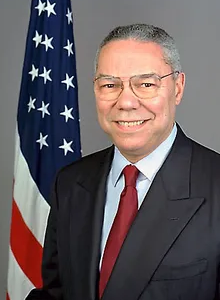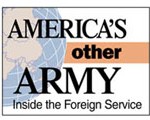Powell: ‘I am on the president’s agenda’
Colin Powell listened with growing but controlled anger. He saw the question coming. After all, there is no charge against a secretary of state more serious than the one leveled by some members of his own Republican Party — and even in the administration he serves.
They accuse him of leading a government agency that not only opposes President Bush’s foreign policy, but also tries to undermine it. His response came out in a single well-known barnyard expletive. Then, to emphasize the point, he added: “That’s quotable.”
“I can show you people in Washington who claim to be pushing the president’s agenda, [but] who are not,” Mr. Powell continued, sitting in his small inner office on the seventh floor of the State Department…


